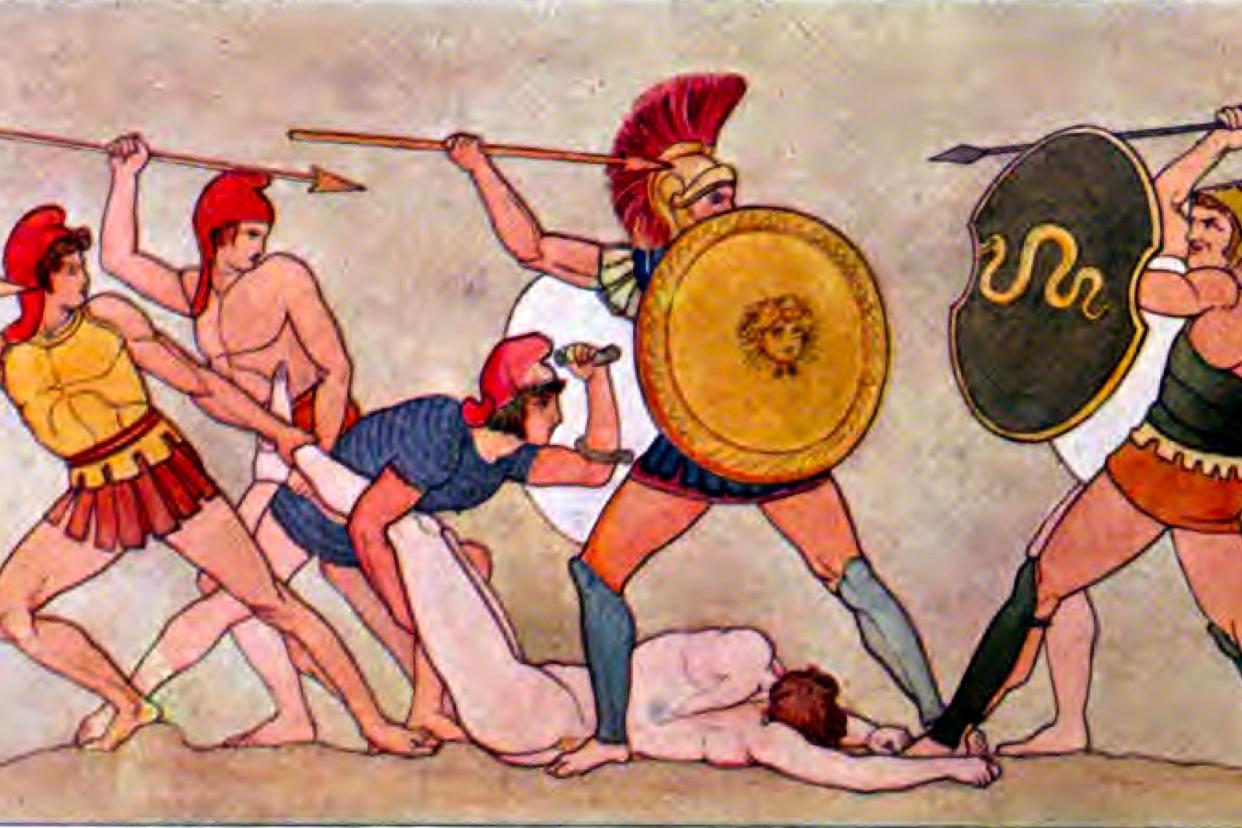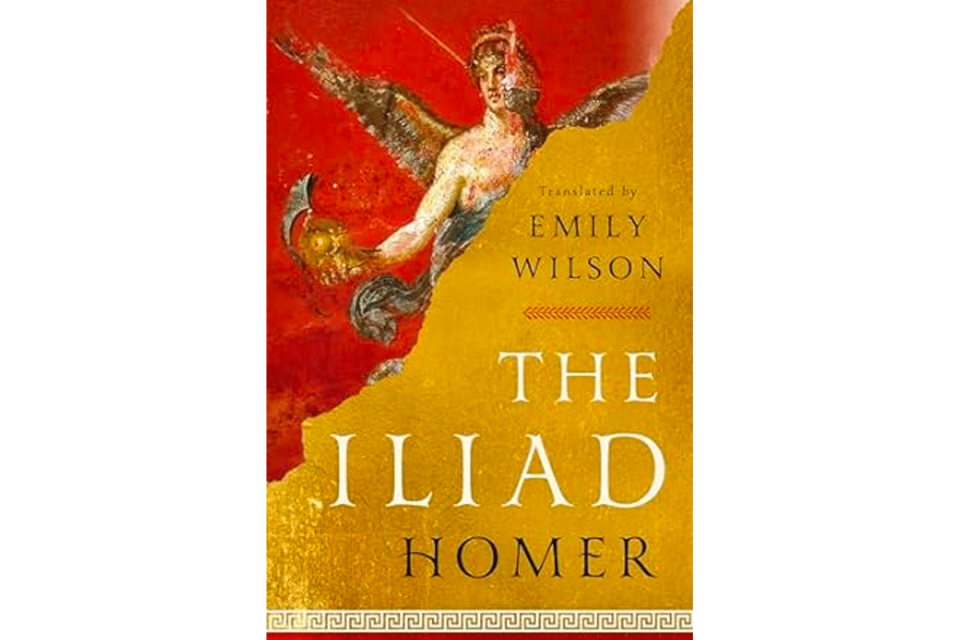The Iliad Is Grim, Bloody, and Packed With Heroes. Are We Ready to Love It Again?

- Oops!Something went wrong.Please try again later.
Translators often go unsung, but Emily Wilson became a household name with the success of her Odyssey. Since then, readers have been waiting for her Iliad to appear—some with pure excitement, others with skepticism that she could work the same magic again. As Wilson herself acknowledges, translating the Other Epic was not simply a matter of repeating a proven recipe. The Iliad and the Odyssey have both come down to us under the name of Homer, but even ancient audiences recognized them to be very different poems.
Both belong to the ancient epic cycle about the Trojan War and its aftermath. Both also use nearly the same idiom and compositional techniques and feature many of the same characters. (Odysseus and Achilles play important roles in each other’s epics.) Yet while the Iliad is a poem that uses mass human death to explore the nature of immortality—of the gods, and of a hero’s name and deeds—the Odyssey’s tale of survival is a reflection on mortality and its consolations. There are other reasons, too, that the worlds of the two poems seem different. In the Greek epic tradition, Zeus engineered the Trojan War to rid the world of its excess of heroes. In the Odyssey we can feel their absence.
Partially for that reason, ancient critics regarded the Iliad as the finer work. Socrates refers, in the Platonic dialogue Hippias Minor, to a widespread notion that the Iliad is superior to the Odyssey because its star, Achilles, is a manlier man than Odysseus. An ancient critic known as Longinus saw the Odyssey as the composition of an aged Homer who had succumbed to the elderly’s habit of storytelling. “Writing the Iliad at the height of his powers,” Longinus observed, “Homer suffused the whole work with drama and action, whereas the Odyssey is full of stories—just like old age.”
In antiquity the Iliad was not just the favorite of intellectuals, it was also the preferred text for study in schools. Ancient papyri preserving lines from the Iliad outnumber those with text of the Odyssey by a ratio of 3-to-1. At North American colleges in the 18th century, the Iliad was required reading (in Greek). For millennia, schoolteachers thought that Homer’s poem about glory in war offered a better model for young men than his tale of misbehavior and wandering.
Only in the 20th century did the Odyssey definitively surpass the Iliad as the better-known and better-liked epic. Longinus’ complaint that it is too full of stories is probably one of the reasons it is more attractive to modern audiences. The Odyssey can feel more dynamic than the relatively stationary Iliad, its settings and characters more varied. It is also more optimistic about the human condition, or at least its ending is happier (from the protagonist’s perspective).
This is why it was a canny move on Wilson’s part to arouse new general interest in Homer by translating the Odyssey first. The dramatic action of the Iliad precedes that of the Odyssey (and it is likely the Iliad was written down first), but the many ways in which the Iliad differs from the Odyssey are also what make it the more challenging, and now less popular, of the two poems.
Naturally, Wilson’s admirers hoped that her second Homeric translation would be as great an achievement as the first. What they might not have expected is that it would be better.
Like her Odyssey, Wilson’s Iliad is crafted in language that is accessible without being modish, and elegant in its brightness and clarity. She continues to render Homeric hexameter into English pentameter, and this translation, too, pulses with a beat that is perceptible but not distracting. Once again, she has also set enough buoys to help first-time readers navigate and stay afloat: the introduction is informative, incisive, and modern; the notes are extensive; the glossary of names a great help.

Wilson’s Iliad outshines its sister poem on two counts. One is owed to the nature of the poem, which puts more weight on language. The Odyssey is flashy about plot: Odysseus’ adventures among monsters and women make for a more natural page turner than the tale of a deadlocked war. The Iliad, by contrast, is more fueled by character—the particular characters of Achilles, Agamemnon, Helen, the several gods—and it is a virtue of Wilson’s translation that she has different characters speak differently. Odysseus might have been a master of lies and persuasion, but the words in the Iliad are often even more remarkable than the deeds.
The other reason the Iliad has added luster is that it conveys the Greek more completely.
One of the more controversial aspects of Wilson’s Odyssey was her commitment to allowing each line of Homeric verse only one line of English, sometimes at the expense of the full sense of the Greek. In the Iliad, each word, name, and epithet is load-bearing, and this time Wilson allows herself the freedom to spill onto more lines. This means that nearly every image and idea of Homer’s makes it into her text.
A passage that illustrates both virtues occurs in Book 14 of the poem, when the Greek and Trojan armies, urged on by Poseidon and Hector, noisily clash on the battlefield:
The sea surged up towards the huts and ships.
The armies clashed with a tumultuous cry.
Louder than roaring of the waves on the shore,
when cruel blasts of Boreas have stirred
the deepest water, louder than the rumble
of blazing fire that leaps to burn a forest
within the thickets on the mountainside,
louder than wind that shrieks through lofty oak trees,
which roars the loudest when it rages most—
louder than all of these, the Greeks and Trojans
let out their terrifying screams and cries
as they attacked each other.
These dozen lines of English translate 10 of Greek, but each image is essential to Homer’s sonic description of the din of war and no word of Wilson’s is superfluous.
There are translation choices that will be controversial, particularly for those versed in Homeric Greek. Readers (and the internet) made much of Wilson’s translation of polutropos, the epithet given to Odysseus in the first line of the Odyssey, with the relatively pedestrian “complicated.” (The adjective literally means “of many turns,” in the sense of versatility and wiliness.) In the Iliad her use of “cataclysmic” for oulomenē, which describes Achilles’ wrath, is likewise provocative. Oulomenē is a word that usually describes someone or something that is hated and cursed by the speaker, while “cataclysmic” is more suggestive of an unstoppable force of nature—a cataclysmic earthquake or flood. The comparison of Achilles’ wrath to a natural disaster is fitting. On the other hand, “cataclysmic” amounts to a more objective-sounding, and elevated, epithet for a turn of events that the narrator reviles.
And then there are moves that are truly inspired. Geras, a spoil of war and so the material evidence of a hero’s glory in battle, becomes “trophy,” which nicely captures the warriors’ regular use of the word to refer to women they have enslaved. In Book 9, Achilles’ articulation of his dilemma—whether to live a long, unremarkable life or die young but covered in glory—contains the sole appearance in the Iliad of what is arguably the poem’s core concept, kleos aphthiton. The phrase has often been translated as something like “undying glory,” but Wilson’s “a name that lasts forever” honors the etymological root of kleos in sound: kleos is connected to glory and fame, but it is literally “what is heard” about someone (the related verb is kluein, “to hear”).
A bit less sublime is Wilson’s translation of kudos as “success,” when the word—which also connects to heroic glory—has a mystical aura to it. Kudos, after all, is often bestowed by the gods. But in her Translator’s Note, Wilson actually explains why she made the choice: to emphasize how ordinary it is in the world of the Iliad for heroes to concern themselves with glory. Translations of Homer are not typically accompanied by translators’ notes, an omission that serves to obscure just how many choices translators make. By giving readers a transparent account of her method and logic, Wilson reminds readers that her version of Homer is precisely that. It does not aspire to be the last word.
In classical antiquity, the Iliad and Odyssey were the kind of poems that no one ever really encountered for the first time. Today we don’t remember when we first heard the “Happy Birthday” song, and in the ancient Greek world few could likely recall their first taste of Homeric verse.
Today relatively few readers come across Homer at all, and fewer still do so before one of his poems appears on a syllabus. In antiquity, the poems were usually performed in segments; now they are often read (or at least assigned) as a whole. That only makes them all the more daunting: students ask what they are to make of all the strange names, the digressions and similes, the heroic world of the battlefield that is structured by logic, values, and expectations so dissimilar to our own.
Now Emily Wilson has not only produced fresh and limpid new translations of two foundational ancient poems. She has also given a new generation of readers the tools to approach Homer, with comfort and confidence, for the very first time. For those who knew the poems already, she lets Homer speak to them in a new voice. And though her Iliad may not prove enough to restore the poem to its preeminence, Homer himself reminds us that fortune’s twists and turns are out of human hands.

